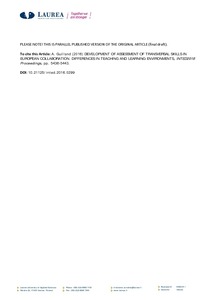Development of Assessment of Transversal Skills in European Collaboration. Differences in Teaching and Learning Environments
Guilland, Auli (2016)
Guilland, Auli
IATED Academy
2016
Julkaisun pysyvä osoite on
https://urn.fi/URN:NBN:fi:amk-2016070713575
https://urn.fi/URN:NBN:fi:amk-2016070713575
Tiivistelmä
The development of digital technology and logistics has promoted globalisation and modernisation of working life creating an increasingly interconnected world. Individuals need to master various technologies and to continuously select between and make sense of large amounts of information.
Modern societies also face collective challenges such as balancing economic growth with environmental sustainability, and prosperity with social equity. In these contexts, the competences that individuals need to display, have become more complex, requiring more than mastering of certain limited skills.
Educational authorities issue guidelines on what should be taught or learnt in schools. Usually these guidelines are included as part of curriculum documents or syllabuses. In recent years, reforms in many countries have reshaped curricula on the basis of new concepts such as 'key competences' and 'learning outcomes' and some have introduced achievement scales. In numerous countries, a subjectbased
organisation with a focus on subject content has given way to a more complex curricular architecture built, in part, on practical skills and on cross-curricular approaches.
New interactive learning environments have been developed to facilitate active learning. These learning environments, promote collaborative and multidisciplinary learning and are increasingly technology enhanced. They allow several transversal competences to be addressed simultaneously. However, these modern pedagogical approaches have not been adopted everywhere.
Relatively little importance has been given to cross-border collaboration in developing education. Thispaper discusses ongoing cross-border collaboration between six European higher educational institutes. Focus of the discussion is on differences in teaching and learning practices in the institutes. Some development obstacles are identified and their influence on cross-border collaboration are reflected.
Modern societies also face collective challenges such as balancing economic growth with environmental sustainability, and prosperity with social equity. In these contexts, the competences that individuals need to display, have become more complex, requiring more than mastering of certain limited skills.
Educational authorities issue guidelines on what should be taught or learnt in schools. Usually these guidelines are included as part of curriculum documents or syllabuses. In recent years, reforms in many countries have reshaped curricula on the basis of new concepts such as 'key competences' and 'learning outcomes' and some have introduced achievement scales. In numerous countries, a subjectbased
organisation with a focus on subject content has given way to a more complex curricular architecture built, in part, on practical skills and on cross-curricular approaches.
New interactive learning environments have been developed to facilitate active learning. These learning environments, promote collaborative and multidisciplinary learning and are increasingly technology enhanced. They allow several transversal competences to be addressed simultaneously. However, these modern pedagogical approaches have not been adopted everywhere.
Relatively little importance has been given to cross-border collaboration in developing education. Thispaper discusses ongoing cross-border collaboration between six European higher educational institutes. Focus of the discussion is on differences in teaching and learning practices in the institutes. Some development obstacles are identified and their influence on cross-border collaboration are reflected.
